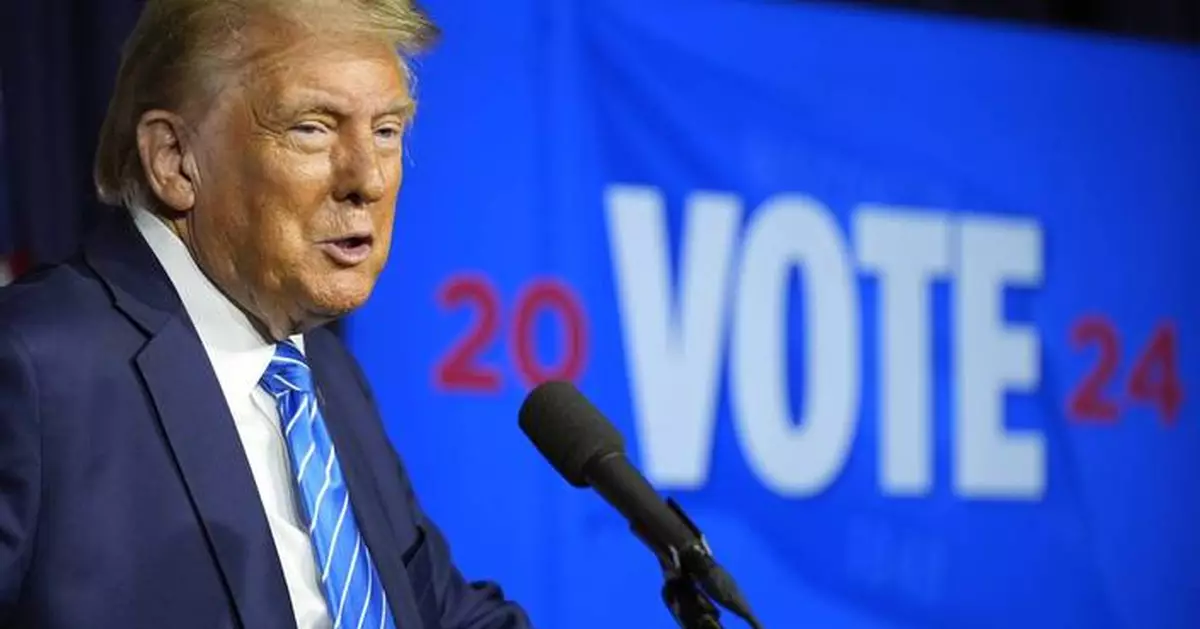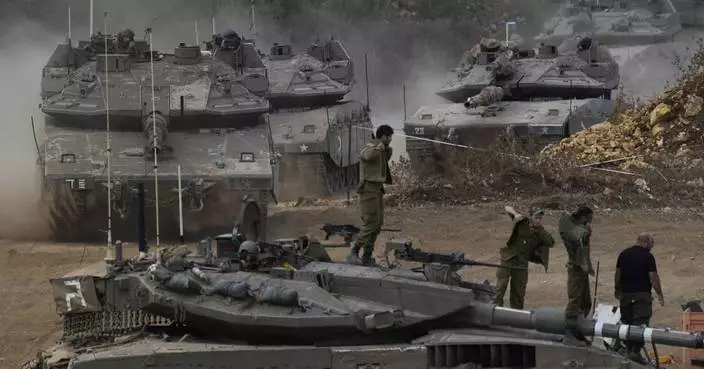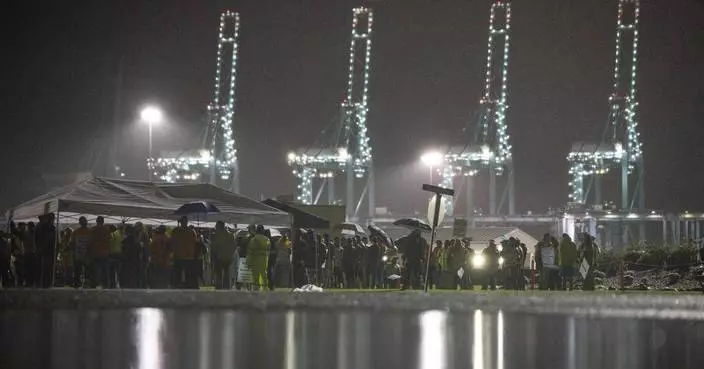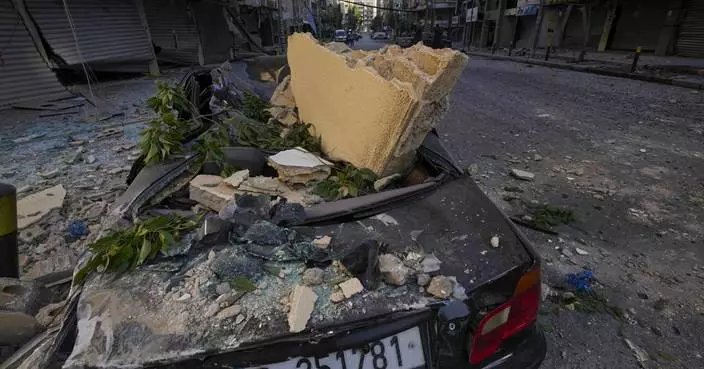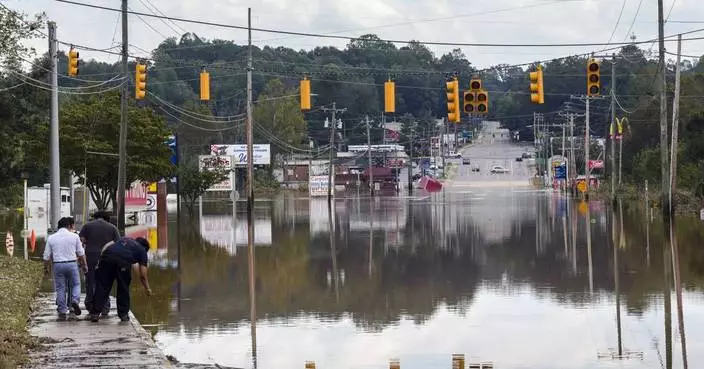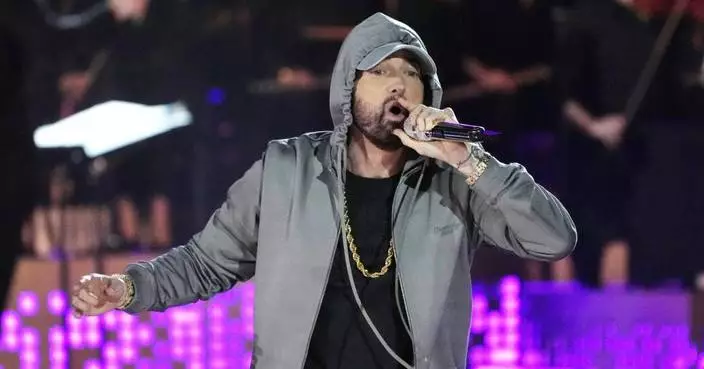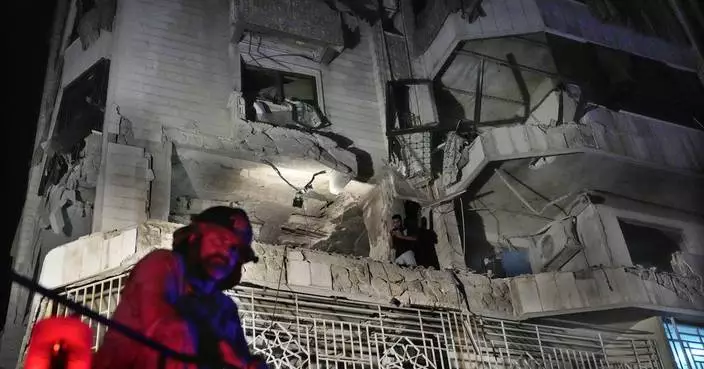WASHINGTON (AP) — Special counsel Jack Smith has provided a road map for how prosecutors hope to prove their case charging former President Donald Trump with an illegal scheme to overturn his 2020 election loss — if it ever gets to trial.
In court papers unsealed Wednesday, Smith's team details new evidence of Trump's “increasingly desperate” efforts to cling to power even as those close to him sought to convince him that he had lost the presidency.
It comes just over a month before the presidential election that could determine the future of the case.
The Republican presidential nominee, who has railed against the case as politically motivated, slammed the filing in a NewsNation interview, calling it “pure election interference” and “weaponization of the government.”
Here's a look at what the filing means and what's next:
The purpose of the filing is to convince U.S. District Judge Tanya Chutkan in Washington that allegations against Trump can move forward to trial even after the Supreme Court in July ruled that former presidents have broad immunity from prosecution.
While the Supreme Court said former presidents have at least presumptive immunity for actions taken in their official role as president, the justices said they are not shielded from prosecution for things they do in their private capacity.
Smith's team is trying to make the case that Trump's prosecution is not off limits because he was acting as a private candidate for office — not a commander in chief — when he schemed to overturn the will of voters. Prosecutors say Trump “must stand trial for his private crimes as would any other citizen.”
“Although the defendant was the incumbent President during the charged conspiracies, his scheme was fundamentally a private one,” prosecutors wrote.
“Working with a team of private co-conspirators, the defendant acted as a candidate when he pursued multiple criminal means to disrupt, through fraud and deceit, the government function by which votes are collected and counted—a function in which the defendant, as President, had no official role."
The case was supposed to go to trial in March in Washington's federal court but was put on hold last December so Trump could appeal his sweeping claims of presidential immunity. Trump had asked the Supreme Court to dismiss the case entirely, saying it the "Presidency itself cannot retain its vital independence, if the President faces criminal prosecution for official acts once he leaves office.”
While the Supreme Court didn't dismiss the case, it effectively stripped from the indictment allegations involving Trump’s dealings with the Justice Department. And it sent the case back to Chutkan to determine which of the remaining allegations in the indictment involve official actions for which Trump may be immune from prosecution and which allegations, if any, can move forward to trial.
In August, Smith's team filed a new indictment that kept the same criminal charges but narrowed the allegations in an attempt to comply with the Supreme Court’s ruling.
Trump's lawyers had objected to the filing, accusing prosecutors of wanting to publicize their “politically motivated manifesto” to hurt Trump's campaign in the final weeks before the election.
The defense will now get a chance to respond to the arguments from Smith's team. Trump's response was due later this month, but Chutkan agreed to give the defense until Nov. 7 after they asked for an extension.
Meanwhile, Trump's lawyers are continuing their efforts to have the case dismissed. The defense on Thursday filed court papers challenging the case on legal grounds, saying prosecutors stretched the laws "beyond their breaking point based on false claims that President Trump is somehow responsible for events at the Capitol.”
Trump's lawyers have argued that the allegations in the indictment — including conversations with his vice president and pressing state officials on the administration of elections — cut to the core of Trump’s responsibilities as commander in chief. Trump attorney John Lauro told the judge during a hearing last month that the Supreme Court’s opinion required the outright dismissal of the case — a position the judge made clear she did not accept.
Even if the judge agrees with prosecutors, the case isn't heading to trial anytime soon. Her rulings are expected to be appealed — likely all the way to the Supreme Court.
And if Trump defeats Vice President Kamala Harris, he could appoint an attorney general who would seek the dismissal of this case and the other federal prosecutions he faces. Or Trump could potentially order a pardon for himself.
The filing gives Democrats new material to use as they campaign against Trump and offers voters a reminder of the allegations just a month out from Election Day, even as voting has already begun in some states.
Trump, too, has seized on the report, casting it as yet another effort by his rivals to try to hobble his campaign — complaints that have proven a powerful motivator for his base and a boon for his fundraising.
It’s unclear, though, what impact it will have on voters, given the wealth of detail about the 2020 campaign that has already been released as well as Trump’s multiple indictments. In polling, concerns about protecting democracy have typically lagged behind concerns about issues like the economy and inflation.
That includes a recent CNN poll that found 4 in 10 likely voters said the economy was their most important issue when deciding how to vote, versus about 2 in 10 who said it was protecting democracy.
The issue of protecting democracy appears to be more important for Democrats and voters already backing Harris. Roughly 4 in 10 voters who support Harris say it is their top issue. For Republicans and Trump supporters, about 6 in 10 name the economy as their top voting issue, followed by immigration. Just 5% of Trump supporters said protecting democracy was their top issue.
Associated Press reporters Jill Colvin in New York and Linley Sanders contributed to this report.
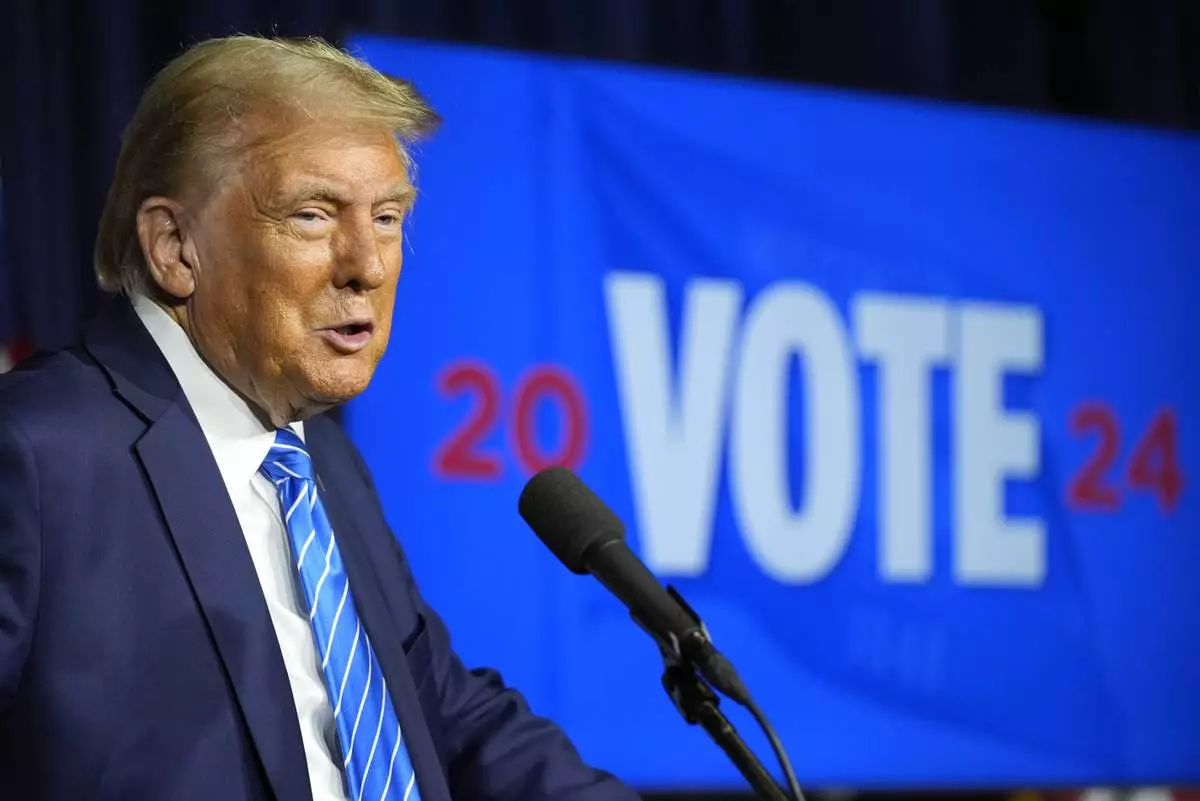
Republican presidential nominee former President Donald Trump speaks at campaign event at Discovery World, Friday, Oct. 1, 2024, in Milwaukee. (AP Photo/Alex Brandon)
BEIRUT (AP) — The Israeli military on Thursday warned people to evacuate a city and other communities in southern Lebanon that are north of a U.N.-declared buffer zone, signaling that it may widen a ground operation launched earlier this week against the Hezbollah militant group.
Israel has told people to leave Nabatieh, a provincial capital, and other communities north of the Litani River, which formed the northern edge of the border zone established by the U.N. Security Council after the two sides fought a war in 2006. Each side accuses the other of violating the resolution.
At least nine Israeli soldiers have been killed in clashes with Hezbollah in southern Lebanon, where Israel announced the start of what it says is a limited ground incursion earlier this week. Meanwhile, the region is bracing for Israeli retaliation following an Iranian ballistic missile attack.
The World Health Organization reported that 28 health workers were killed in the past day in Lebanon, and access to medical care is becoming limited as three dozen health facilities closed in the south and five hospitals were either partly or fully evacuated in Beirut.
The Lebanese health minister said Israeli strikes that hit nine hospitals and 45 health care centers violate international law and treaties.
“International laws are clear in protecting these people — I mean, paramedics," Firas Abiad said. "Who gave Israel the right to be the judge and the executioner at the same time?”
The Lebanese Red Cross said an Israeli strike wounded four of its paramedics and killed a Lebanese army soldier as they were evacuating wounded people from the south. It said the convoy near the village of Taybeh, which was accompanied by Lebanese troops, was targeted Thursday despite coordinating its movements with U.N. peacekeepers. There was no immediate comment from the Israeli military.
Another Lebanese soldier was killed by Israeli fire at an army post in the southern town of Bint Jbeil, according to the Lebanese military, which said it returned fire. A Lebanese security official, who spoke on condition of anonymity according to regulations, said the army post was hit by artillery fire.
An Israeli airstrike on an apartment in central Beirut late Wednesday killed nine people, including seven Hezbollah-affiliated civilian first responders. Israel has been pounding areas of the country where the militant group has a strong presence since late September, but has rarely struck in the heart of the capital.
There was no warning before the strike late Wednesday, which hit an apartment not far from the United Nations headquarters, the prime minister’s office and parliament.
Residents reported a sulfur-like smell following the strike in Beirut, and Lebanon’s state-run National News Agency — without providing evidence — accused Israel of using phosphorous bombs, which can cause severe burns and could violate international law. Human rights groups have in the past accused Israel of using white phosphorus incendiary shells on towns and villages in southern Lebanon.
The Israeli army said it has shells containing white phosphorous that do not violate international law, but it did not say if they were used in the attack. Army officials said the primary shells they use to create a smokescreen do not contain the substance.
The Palestinian Health Ministry said 16 people were killed Thursday in an Israeli strike on the Tulkarem refugee camp in the West Bank. It was the deadliest strike in the occupied territory since the Israel-Hamas war erupted last October.
The military said the strike was carried out in coordination with the Shin Bet internal security service, but it gave no details on the target. Tulkarem is a militant stronghold in the northern West Bank. It remained unclear how many people were wounded in the blast.
Violence has flared across the Israeli-occupied territory since the Israeli-Hamas war erupted last October. Tulkarem and other northern Palestinian cities have seen some of the worst violence. Palestinian militant groups are active across the northern West Bank, areas where the Palestinian Authority has a limited foothold.
The Israeli military said Thursday that it had struck around 200 Hezbollah targets across Lebanon, including weapons storage facilities and observation posts. It said the strikes killed at least 15 Hezbollah fighters.
There was no immediate comment from Hezbollah. But if the claim is true, it would mark the latest in a string of assassinations of top Hezbollah officials in recent weeks, including its longtime leader Hassan Nasrallah.
The Israeli military also said Thursday that it had killed a senior Hezbollah militant, Mohammed Anisi, who was involved in the group’s development of precision guided missiles. Anisi was killed in an airstrike targeting the group’s intelligence branch in Beirut, the army said.
Hezbollah said its fighters detonated a roadside bomb when Israeli forces entered the Lebanese border village of Maroun el-Ras, killing and wounding soldiers. It was not possible to independently confirm the claims made by either side.
So far, ground clashes between Israeli forces and Hezbollah militants have been confined to a narrow strip along the border.
But hundreds of thousands of people have fled their homes, as Israel has warned people to evacuate from dozens of villages and towns in the south, telling them to relocate to areas that are around 60 kilometers (36 miles) from the border and considerably farther north than the Litani River.
Under U.N. Security Council Resolution 1701, which ended the monthlong 2006 war between Israel and Hezbollah, the militants were to withdraw north of the Litani, and Lebanon's armed forces were to patrol the border region along with U.N. peacekeepers.
Neither Lebanon's army nor the peacekeepers were capable of imposing any agreement on Hezbollah by force, and Israel says it defied the resolution and built extensive military infrastructure in towns and villages near the border. Lebanon has accused Israel of violating other parts of the resolution.
Israel says it is targeting Hezbollah after nearly a year of rocket attacks that began Oct. 8 and displaced some 60,000 Israelis from communities in the north. Israel has carried out retaliatory strikes over the past year that have displaced tens of thousands on the Lebanese side.
In recent weeks, Israeli strikes in Lebanon have killed Hezbollah leader Hassan Nasrallah and several of his top commanders. Hundreds more airstrikes across large parts of Lebanon since mid-September have killed at least 1,276 people, according to Lebanon’s Health Ministry. Nearly 2,000 people have been killed and more than 9,000 wounded in Lebanon since the fighting began nearly a year ago.
The vast majority of recent strikes have been in areas where Hezbollah has a strong presence.
Iran-backed Houthi rebels in Yemen said they launched two drones at Tel Aviv overnight. The military said it identified two drones off the coast of the bustling metropolitan area, shooting one of them down while the other fell in the Mediterranean Sea.
Hezbollah, Hamas and the Houthis are part of the Iran-led Axis of Resistance, which also includes armed groups in Syria and Iraq. They have launched attacks on Israel in solidarity with the Palestinians, drawing retaliation in a cycle that has repeatedly threatened to set off a wider war.
The region once again appears on the brink of such a conflict after Iran’s missile attack on Tuesday, which it said was a response to the killing of Nasrallah, an Iranian Revolutionary Guard general who was with him, and Ismail Haniyeh, the political leader of Hamas, who was killed in an explosion in Tehran in July that was widely blamed on Israel.
Both Israel and the United States have said there will be severe consequences for the missile attack, which lightly wounded two people and killed a Palestinian in the occupied West Bank. The United States has rushed military assets to the region in support of Israel.
The escalating violence in Lebanon has opened a second front in the war between Israel and Iran-backed militants that began nearly a year ago with Hamas’ surprise Oct. 7 attack from the Gaza Strip into Israel.
The Israeli military said Thursday that it killed a senior Hamas leader in an airstrike in the Gaza Strip around three months ago. It said that a strike on an underground compound in northern Gaza killed Rawhi Mushtaha and two other Hamas commanders.
There was no immediate comment from Hamas. Mushtaha was a close associate of Yahya Sinwar, the top leader of Hamas who helped mastermind the Oct. 7 attack. Sinwar is believed to be alive and in hiding in Gaza.
Jeffery reported from Jerusalem. Associated Press staff writers Abby Sewell and Kareem Chehayeb in Beirut and Zeina Karam in London contributed to this report.
Follow AP’s war coverage at https://apnews.com/hub/israel-hamas-war
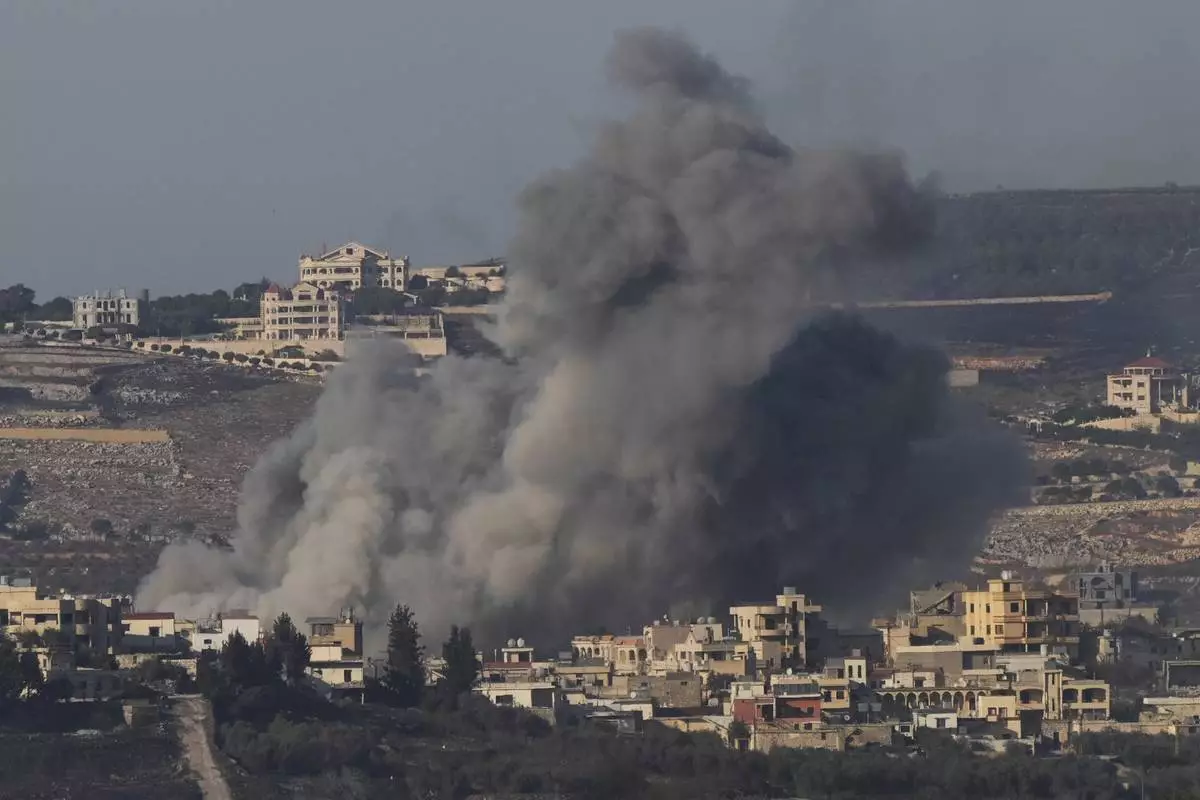
Smoke rises following an Israeli bombardment in southern Lebanon as seen from northern Israel, Thursday, Oct. 3, 2024. (AP Photo/Baz Ratner)
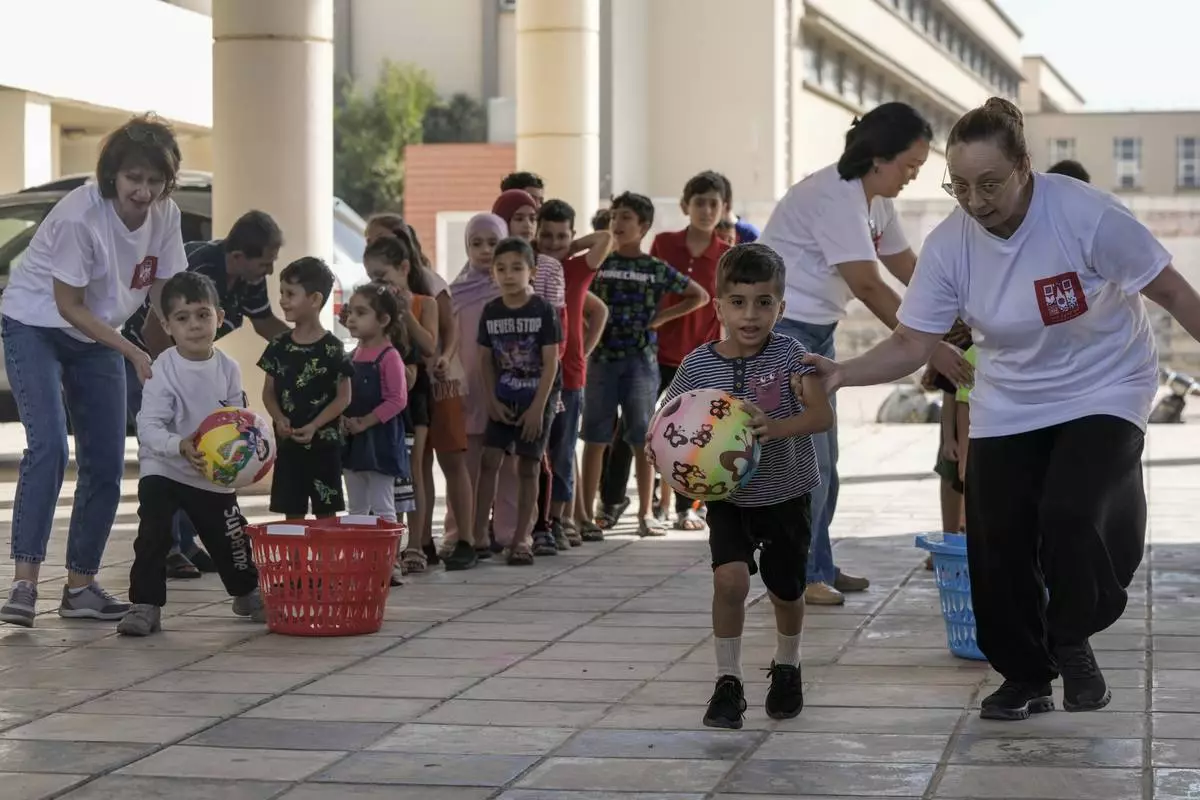
Volunteers of the Russian Cultural Center entertain displaced children at a school in Beirut, Lebanon, Thursday, Oct. 3, 2024, after fleeing the Israeli airstrikes in the south. (AP Photo/Bilal Hussein)
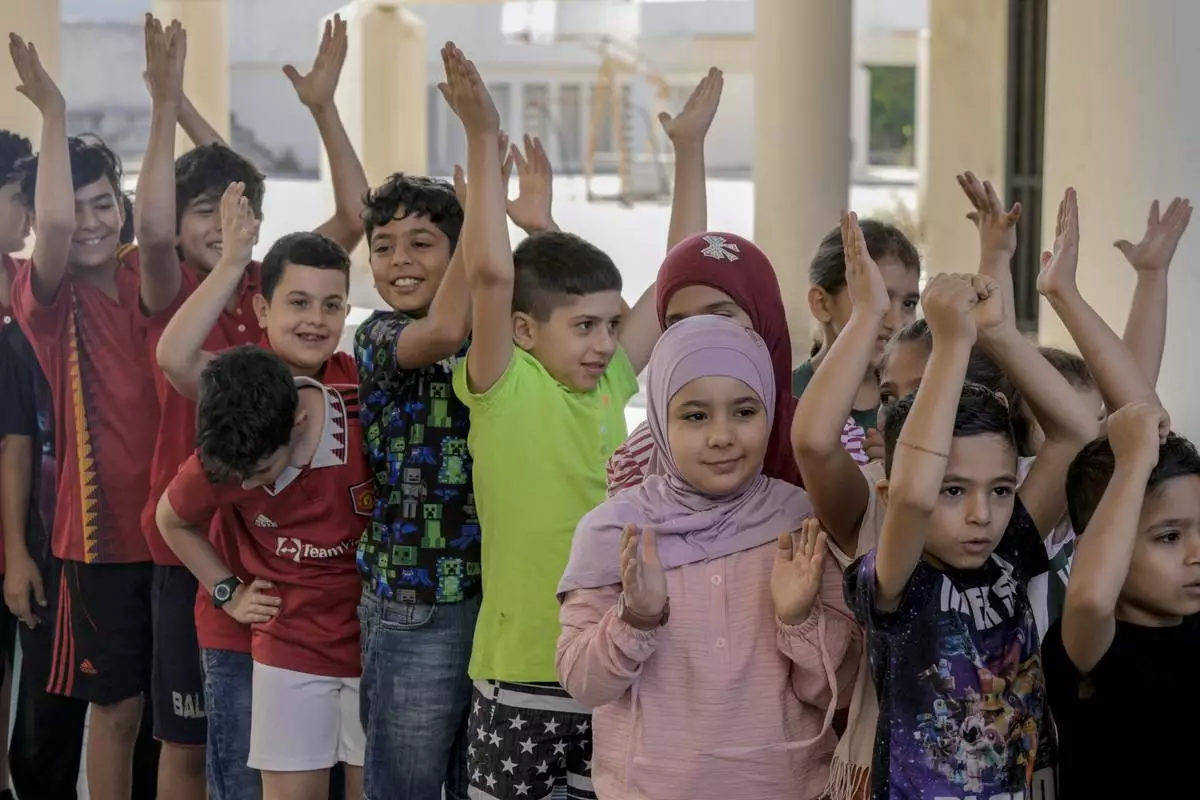
Volunteers of the Russian Cultural Center entertain displaced children at a school in Beirut, Lebanon, Thursday, Oct. 3, 2024, after fleeing the Israeli airstrikes in the south. (AP Photo/Bilal Hussein)
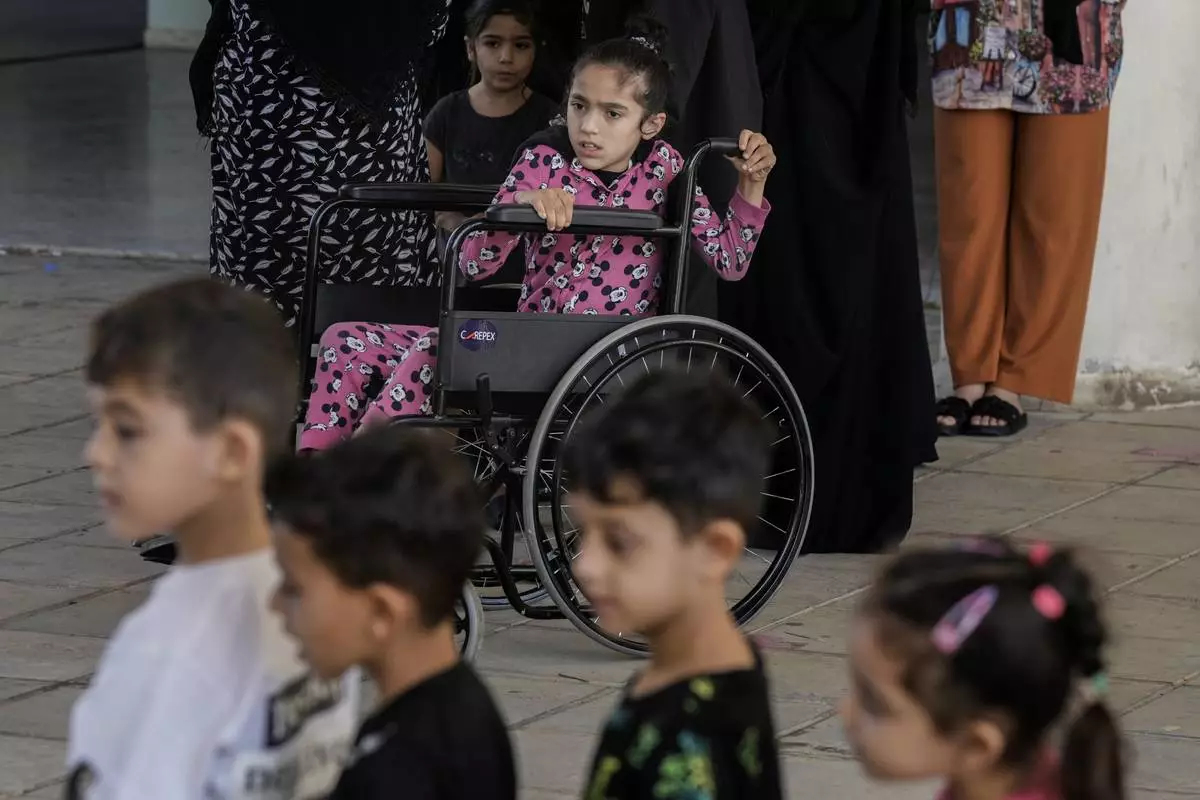
Zahraa on a wheel chair looks on as volunteers of the Russian Cultural Center entertain displaced children at a school in Beirut, Lebanon, Thursday, Oct. 3, 2024, after fleeing the Israeli airstrikes in the south. (AP Photo/Bilal Hussein)
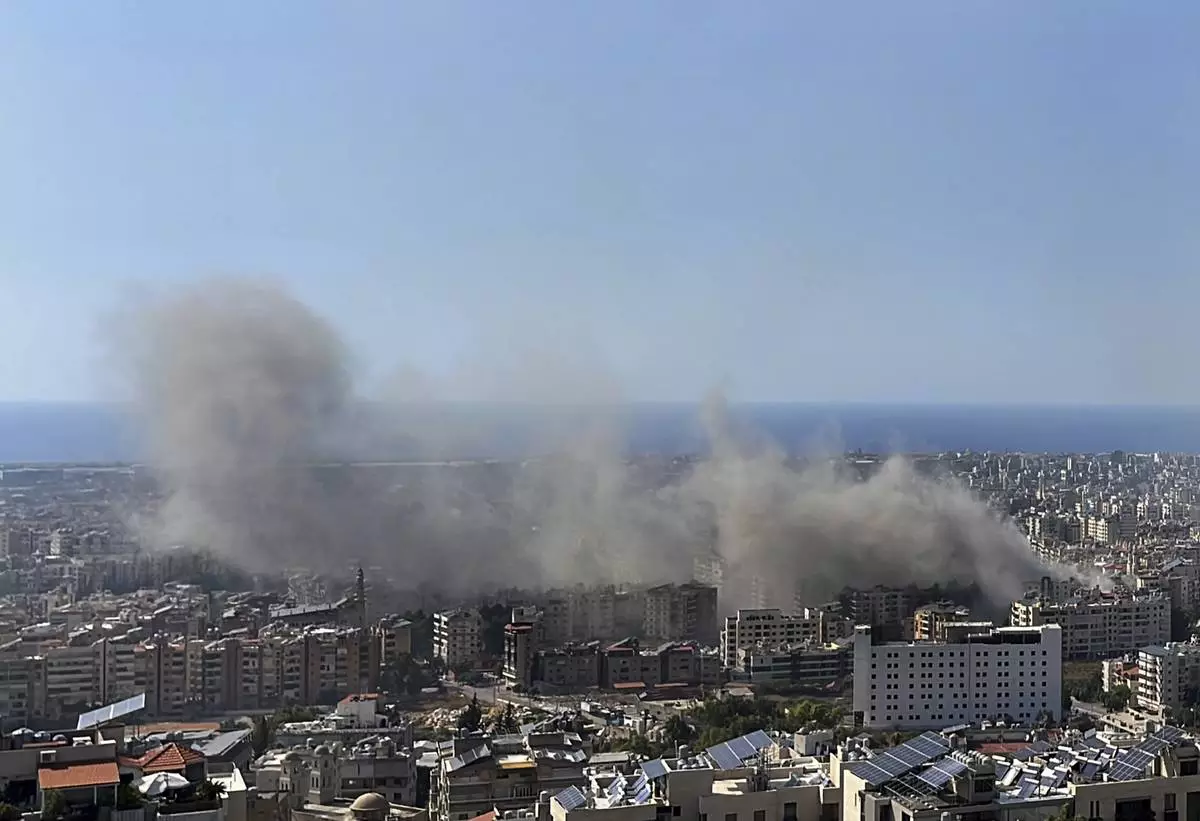
Smoke rises after Israeli airstrikes in Dahiyeh, Beirut, Lebanon, Thursday, Oct. 3, 2024. (AP Photo/Fadi Tawil)
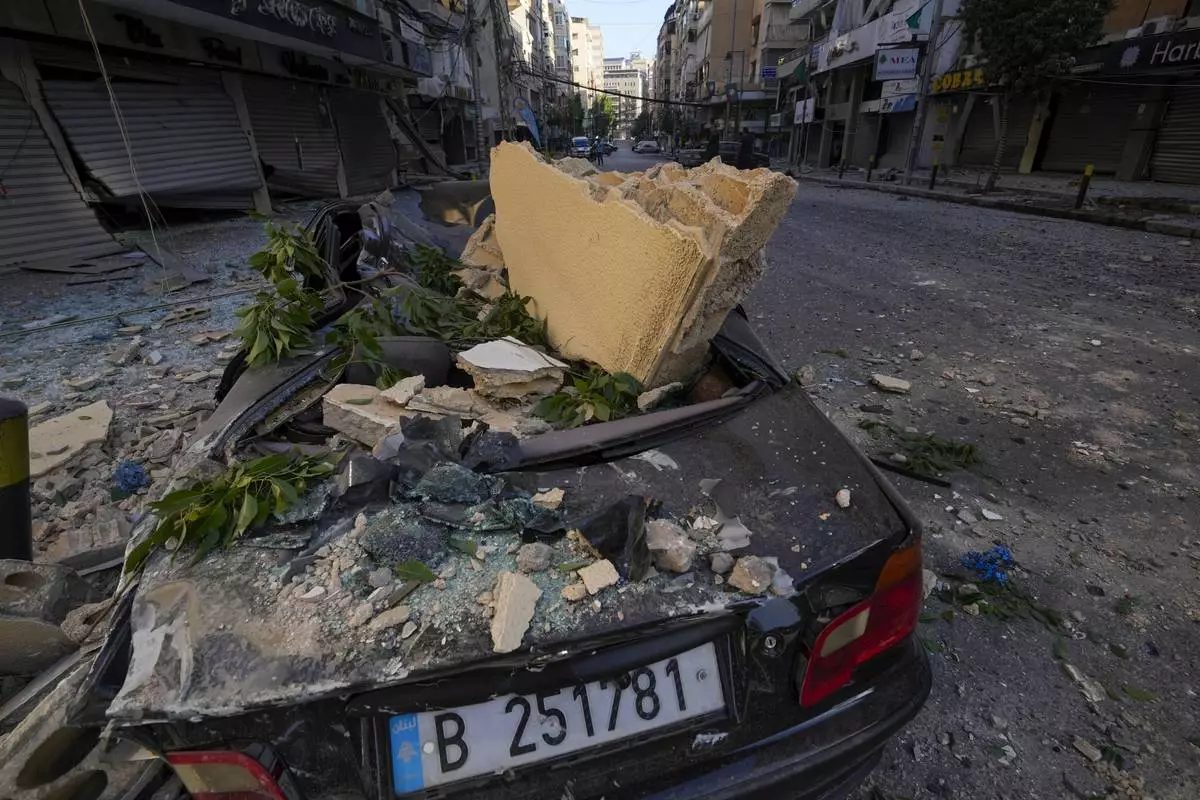
A wrecked car parked next to the site of an Israeli airstrike in Dahiyeh, Beirut, Lebanon, Thursday, Oct. 3, 2024. (AP Photo/Hassan Ammar)
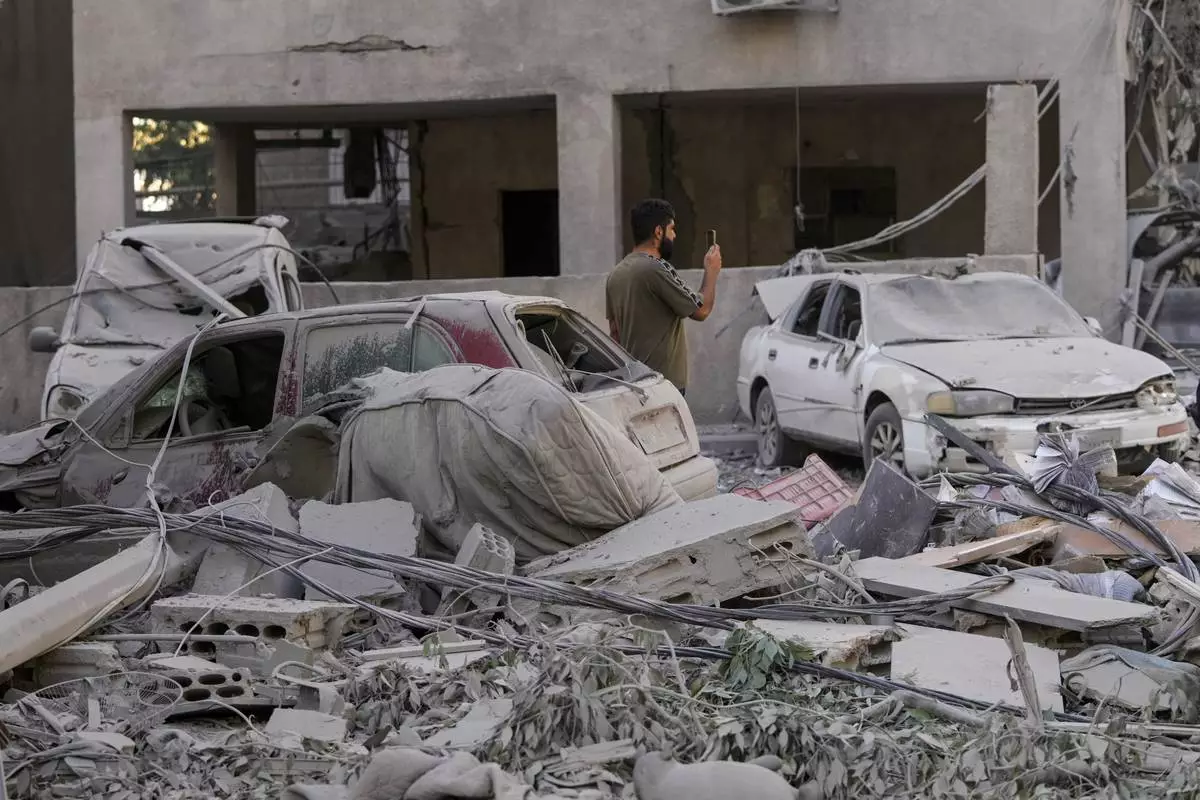
A man documents the damaged buildings at the site of an Israeli airstrike in Dahiyeh, Beirut, Lebanon, Thursday, Oct. 3, 2024. (AP Photo/Hassan Ammar)
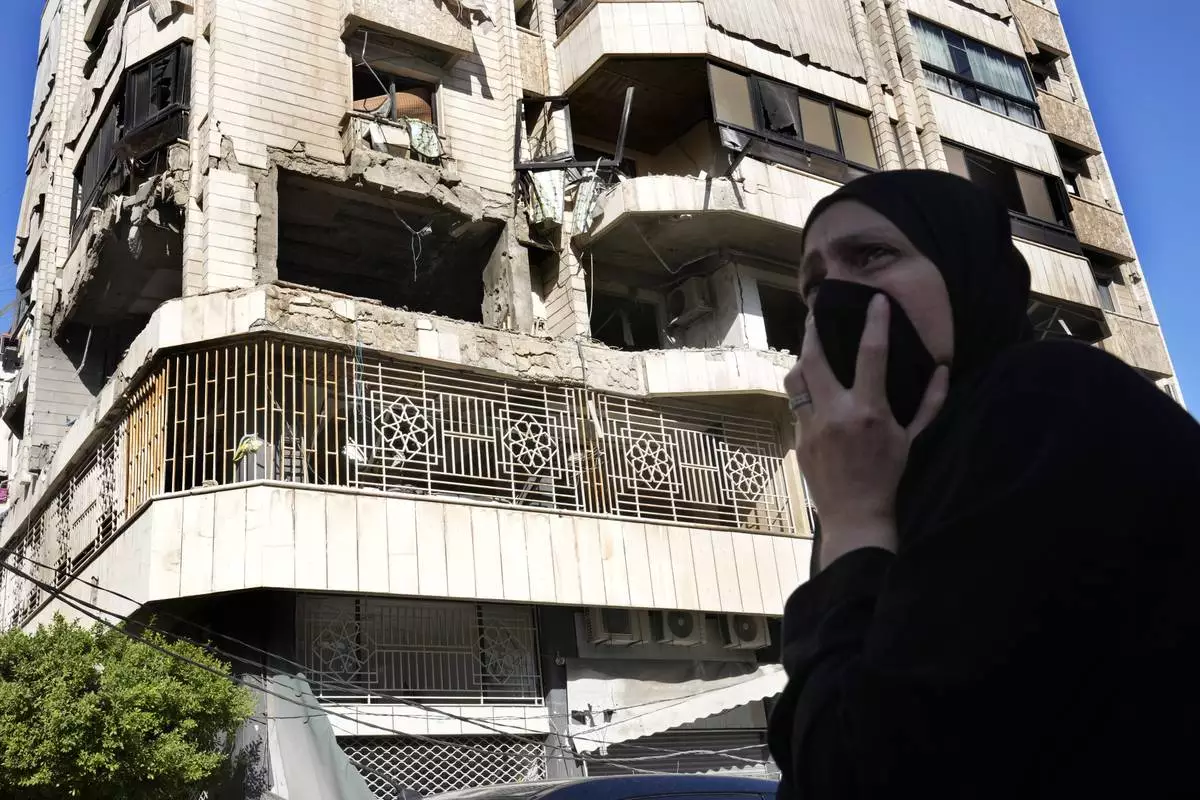
A woman reacts in front an apartment in a multistory building hit by Israeli airstrike, in central Beirut, Lebanon, Thursday, Oct. 3, 2024. (AP Photo/Hussein Malla)
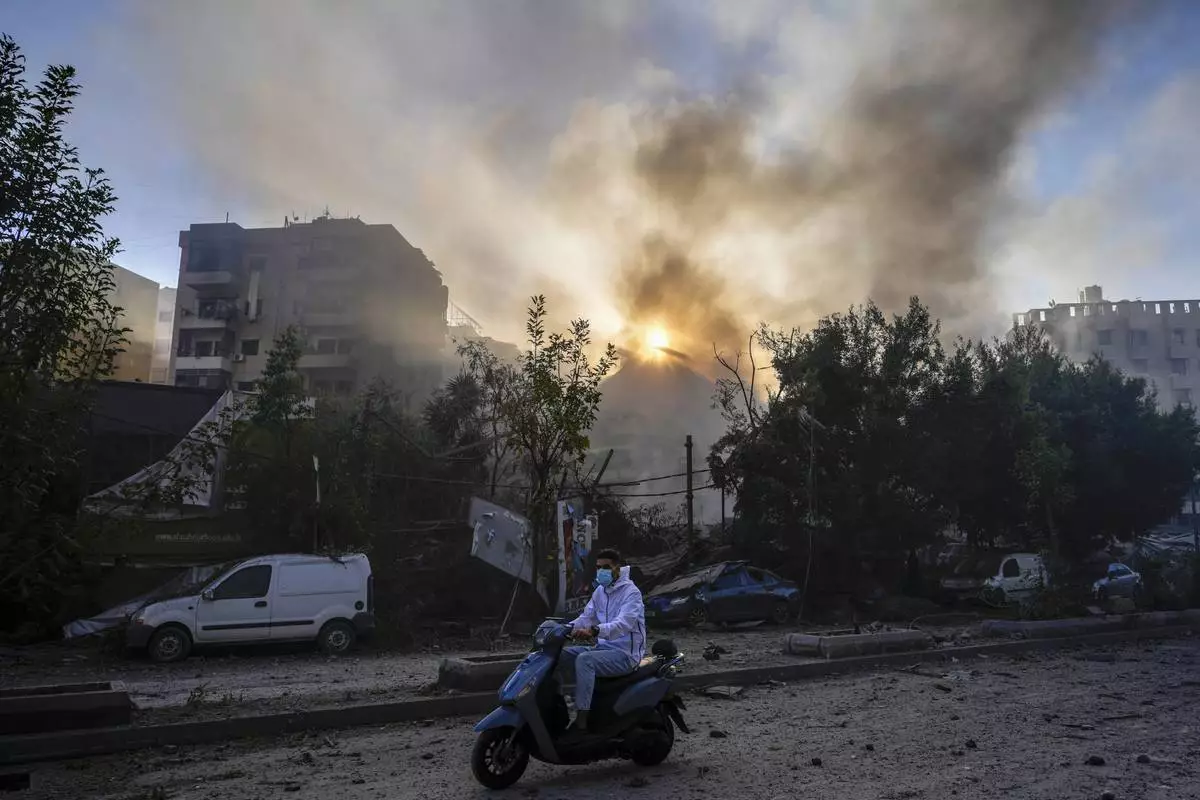
Smoke rises from the site of an Israeli airstrike in Dahiyeh, Beirut, Lebanon, Thursday, Oct. 3, 2024. (AP Photo/Hassan Ammar)
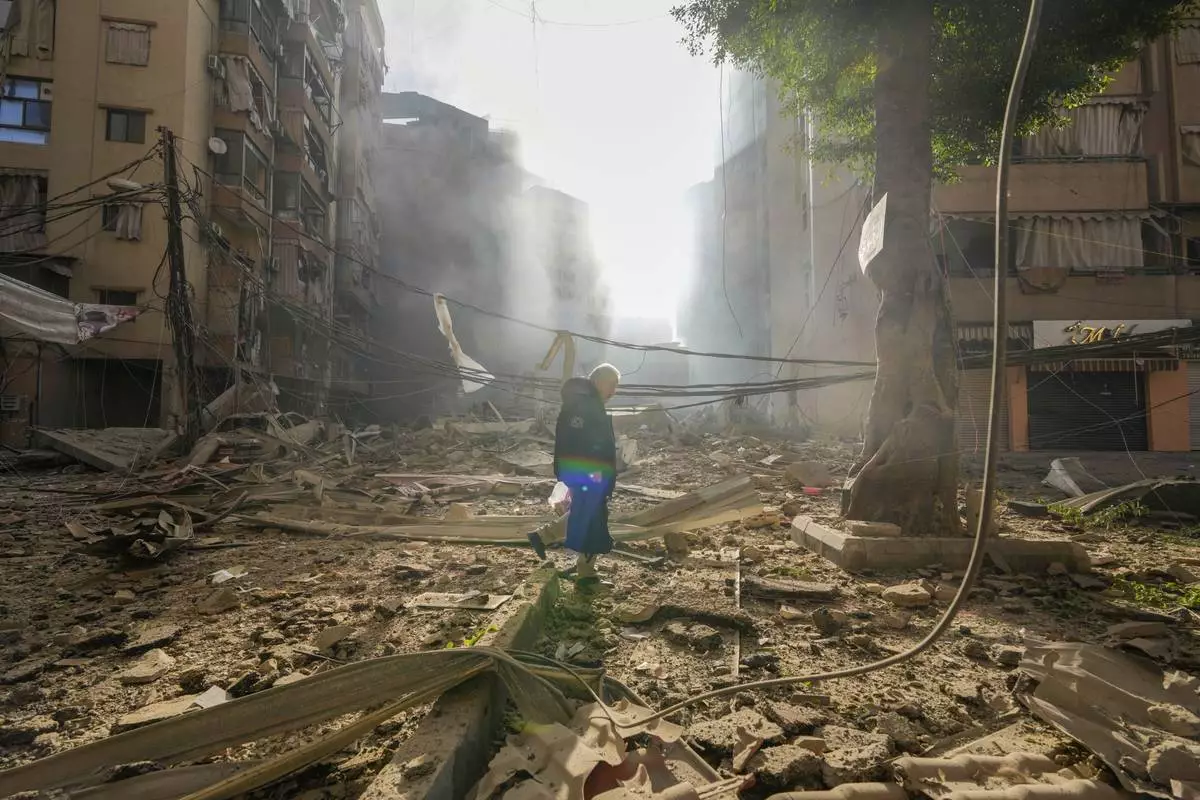
Smoke rises from the site of an Israeli airstrike in Dahiyeh, Beirut, Lebanon, Thursday, Oct. 3, 2024. (AP Photo/Hassan Ammar)
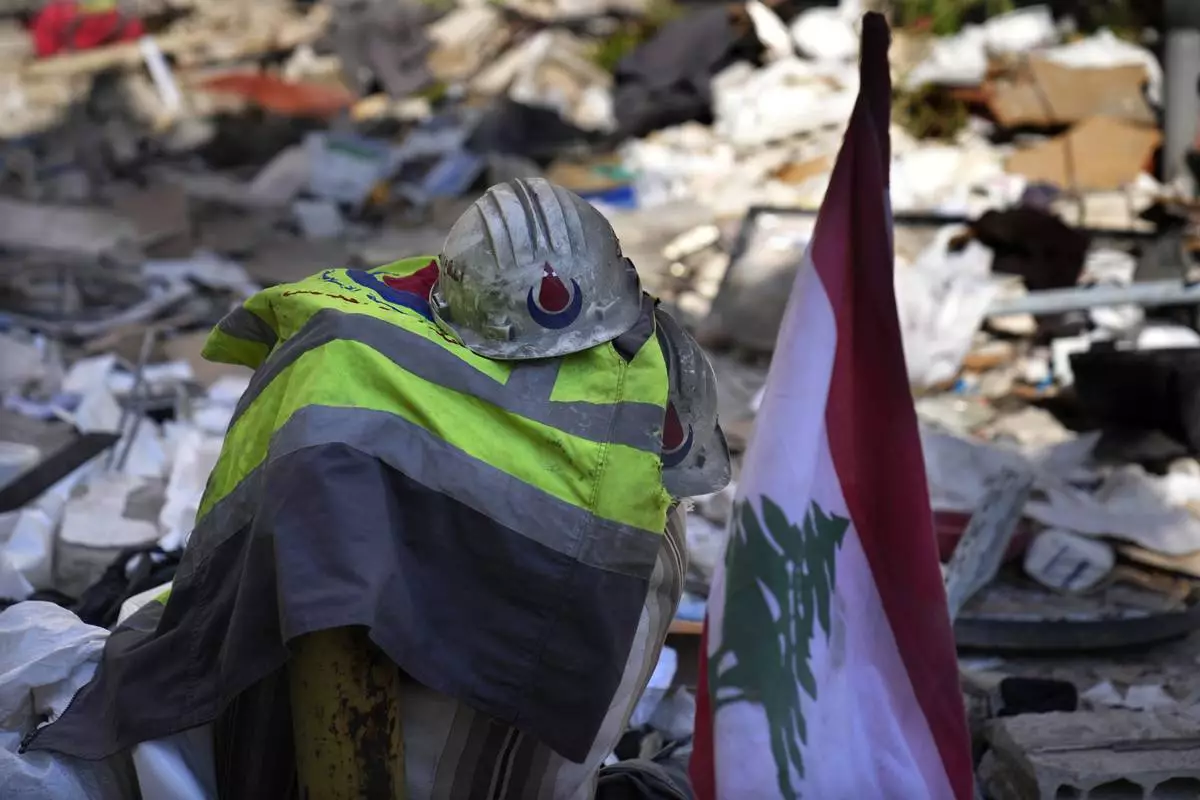
Hezbollah paramedic stuff left on the debris after an airstrike hit an apartment in a multistory building, in central Beirut, Lebanon, Thursday, Oct. 3, 2024. (AP Photo/Hussein Malla)
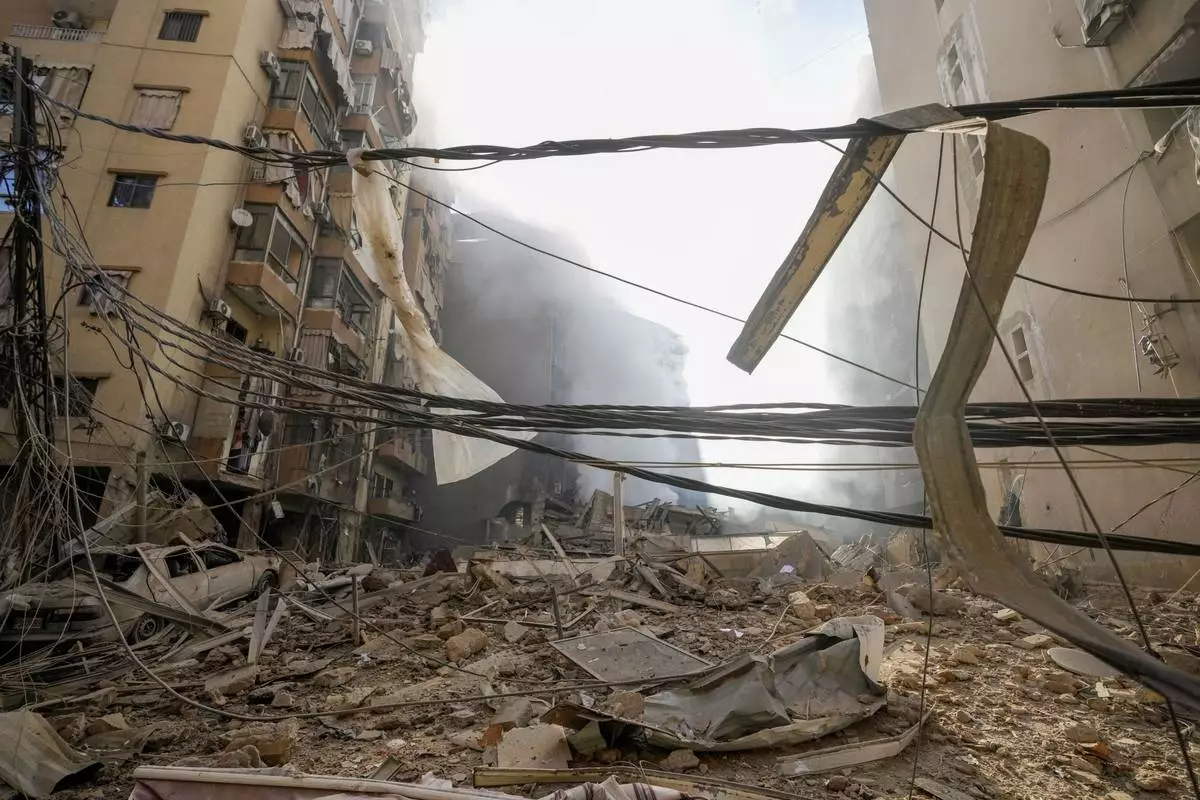
Smoke rises from the site of an Israeli airstrike in Dahiyeh, Beirut, Lebanon, Thursday, Oct. 3, 2024. (AP Photo/Hassan Ammar)
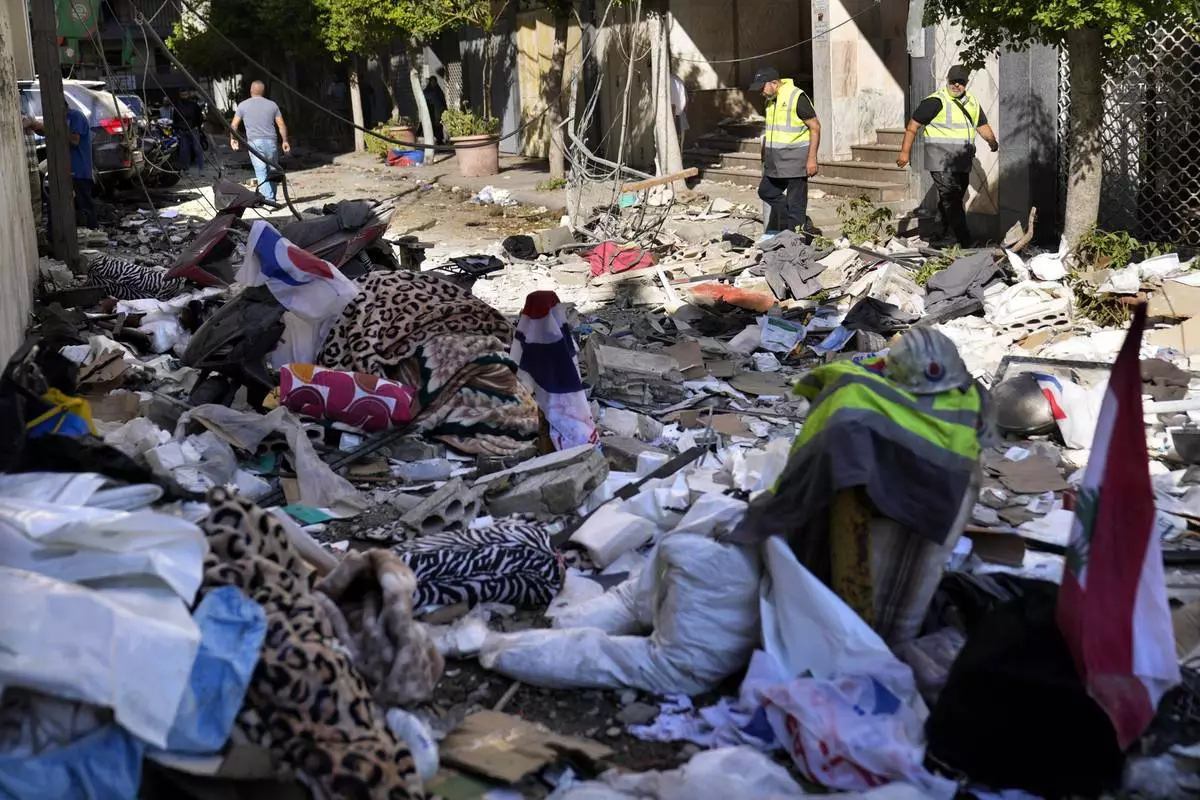
Hezbollah paramedics walk between debris after an airstrike hit an apartment in a multistory building, in central Beirut, Lebanon, Thursday, Oct. 3, 2024. (AP Photo/Hussein Malla)
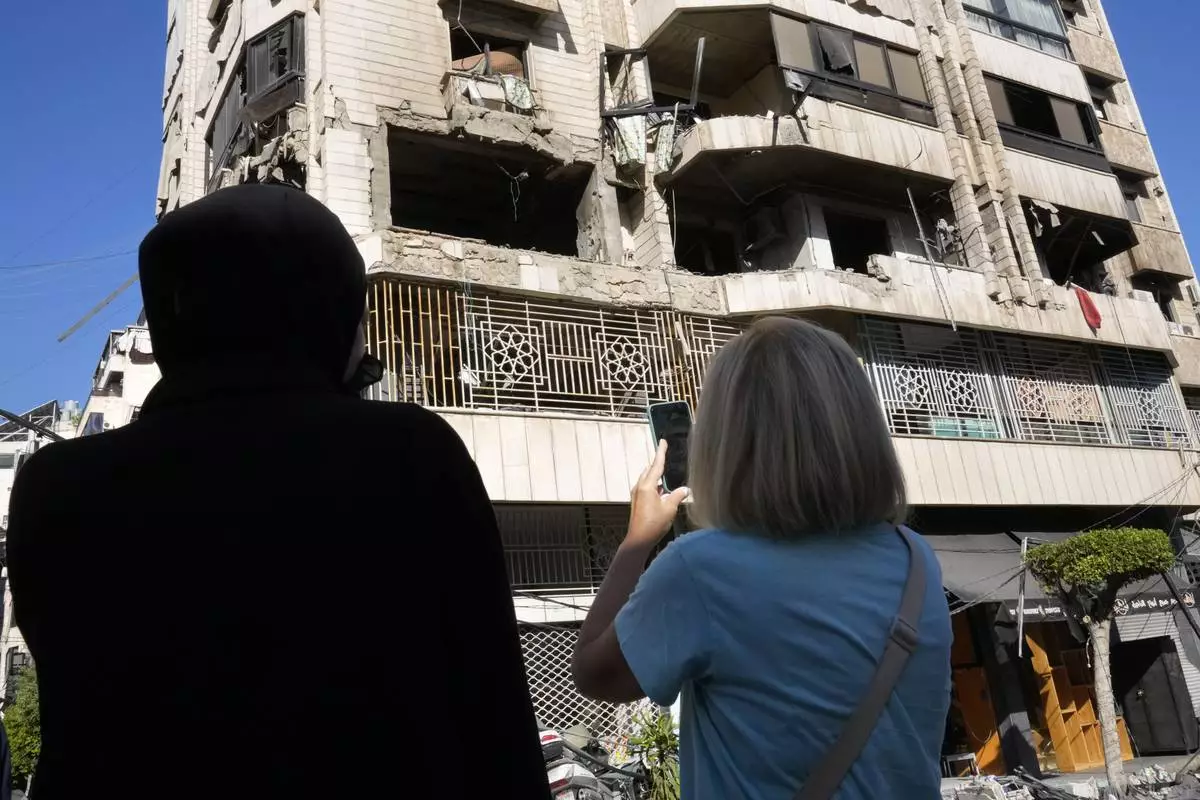
Lebanese women stand in front an apartment in a multistory building hit by Israeli airstrike, in central Beirut, Lebanon, Thursday, Oct. 3, 2024. (AP Photo/Hussein Malla)



